Gazelle Twin has given Brexit a suitably twisted face and written a soundtrack for the bitterness beneath our green and pleasant land
"Where do we live? Are we safe? What are the next ten years going to be like?"
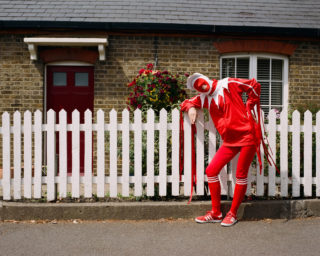
"Where do we live? Are we safe? What are the next ten years going to be like?"
The black-clad figure ambling through the halls of the National Gallery wouldn’t draw many furtive glances. The closest she comes to provoking any side-eye is when a slightly nonplussed attendant overhears her comparing the dramatic, doomy skies of a 19th-century painting to a scene from Ghostbusters 2 (for the record, Elizabeth Bernholz, better known as Gazelle Twin, is absolutely on the money: it really, really does).
You wouldn’t suspect that, only a couple of days previously, she’d been skulking around Walthamstow Village while dressed as ‘the jester’: a half-menacing, half-mischievous… thing. Even for someone with Bernholz’s knack for stomach-knotting theatricality, it’s an unnerving sight. It has red Adidas trainers on its feet and football socks pulled all the way up to its knees; it wears a red tracksuit with white piping, and red tassels draping from its elbows. There’s a pair of tights, red again, stretched over its face, a white star-shaped collar around its neck, and its disturbing near-blank head is sandwiched between a white hat and chin-strap. The only visible flesh is its mouth, which is permanently fixed in aleering, tooth-flashing smile. It looks like a creature from Pan’s Labyrinth that’s gone on a trolley dash in Sports Direct. As she prowled past the well-kept lawns while posing for Loud And Quiet’s photographer, Jenna, passers-by tended to either look at her askance or avoid eye contact altogether. Some youngsters, though, were more curious. “I was trying very hard to stay away from children, but we did bump into a few kids. A lot of them thought I was Spider-Man,” she laughs.
Every time Bernholz brings those tights down over her face, she says, she starts to feel physically different. “Pulling that red veil down is really scary. The first time I did it, I just felt like I needed to grin. It totally transforms me… I felt like I instantly needed to get up to mischief.”
Bernholz has fun making mischief on ‘Pastoral’, too. It’s her third official album as Gazelle Twin, following 2011’s debut ‘The Entire City’ and 2014’s ‘Unflesh’, and it might be her most startling record to date – which is pretty impressive, seeing as she only really makes startling records as a general rule. Her vision of the pastoral, unsurprisingly, is very different from its roots. Traditionally, pastoral artists would mythologise the countryside as a place of peace and purity, rhapsodising the delights of bucolic havens where good-natured shepherds and meek maidens could flourish away from the decadent rot of the city.
But Bernholz, who moved from Brighton to Leicestershire in 2014, found that the simple life actually wasn’t very simple at all – especially after her new neighbours voted in their droves to leave the EU in the 2016 referendum. And so, in the same way David Lynch delved beneath the well-manicured lawns of white-picket-fence America to show the slime and ooze underneath, on ‘Pastoral’ she exposes the bizarre bitterness lurking beneath Middle England’s chocolate-box facade.
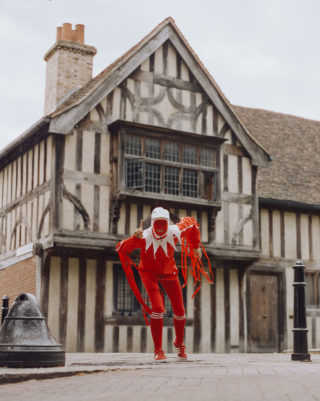
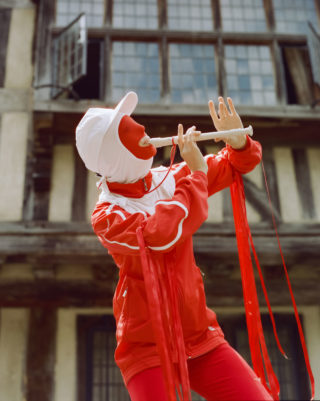
Originally, Bernholtz planned on making an album about “the bizarre desires related to objects”, before the weird realities of rural life began creeping into her thoughts instead. “I moved away from the city – a very liberal city – to a very provincial and mostly conservative part of England,” she explains. “I’d just had a kid, so I was feeling really protective and strange about life in general. As soon as my son was born, I was assessing everything: Where do we live? Are we safe? What are the next ten years going to be like?
“All of that was already going on in my head, and then when the EU referendum took place, I just felt like a shell. But I was also really angry at the same time, and quite disappointed to discover people I know who supported and justified the Leave vote. I felt very helpless and deeply worried, too, given the sort of vitriol it seemed to encourage from people. So we had this instant thought of: ‘Oh my God, does everyone around here feel the same? Are we living in a place we clearly do not belong?’”
On ‘Pastoral’, the jester is the anarchic mascot for an environment that can be scary, hostile, surreal and creepy. It’s full not of rustic cheer, but instead suspicion, fear, eye-rolling pettiness, infuriating ignorance and small-minded stubbornness. There’s a xenophobic taxi driver ranting and raving about the good old days and a tubthumping zealot trying to whip up thirst for a crusade, as well as snooty baby-boomers and village busy-bodies. They’re all voiced by Bernholz, and her vocal changes to suit each character: alternating between sinister whispers, panicked wheezes, sonorous trillings and, at one point, Mr Punch. In the way it chews over the complicated relationship between places, people, history and identity, it doesn’t feel a million miles removed from PJ Harvey’s ‘Let England Shake’ – except Bernholz’s compositions mix computer-tooled sounds with toots on her old recorder from school, and instead of soldiers wounded fighting at Gallipoli there are old bigots muttering darkly at village fetes.
She insists, on more than one occasion, that this album is not intended as a one-sided polemic or moral judgement. It’s more about the confusion and bewilderment she’s felt in the last few years. On a personal level, she remembers feeling “really pissed off” that she’d finally got herself into a position to “make a basic living from music for the first time in fifteen years”, only for that sense of security to vanish as soon as the referendum results were announced, because of the implications for touring in Europe. More broadly, she’d hear people in public starting to “spout venom” and feel isolated. “The idea with the rural is to move into God’s country, and be somewhere safe, where everyone’s like you and on your side,” she says. “But we suddenly just felt very afraid.”
That’s why ‘Pastoral’ sounds so disorienting, like it’s trying to wrongfoot you at every turn. Its sound is a clash of modern noise and traditional instruments, as if wistful folksy notes and melodies have been wrung through an electronic mangle. Bernholz was a huge folk fan as a teenager, and credits both her recorder and a Midi harpsichord with imbuing the record with the “misty”, “dreamy” tones that are squished together with more modern production ideas. There are snatches of old voices and songs, too, while ‘Dance Of The Peddlers’ mixes its condemnations of the tabloid press with excerpts from William Blake’s poem The Tyger (the red-tops, says Bernholz, are the only papers available in her local shops). It feels telling that the album’s opening track, the mystical-yet-ominous sounding ‘Folly’, asks four questions – “What species is this? What century? What atmosphere? What government?” – and never answers any of them. “Imagine if you were a viewer from another planet and landed here now,” she stresses. “You’d be trying to make sense of it, and you can’t. It’s gotten to the point where it’s just so incomprehensibly mad that you wonder, are we all the same species?”
There’s something equally disconcerting about the artwork, inspired by a painting from the Bolton-born American artist Thomas Cole’s The Course Of Empire series – part of the reason we’ve come to the gallery today is to get a closer look at the real thing. The cover for ‘Pastoral’ depicts a similarly lush environment, but there’s only one figure in view – the jester – and its mere presence is enough to make you feel uneasy. Another image inside the album, of Bernholz-as-the-jester in some medieval stocks, will provoke a similar reaction. “There’s loads of them where I live,” she says. “And you think: ‘Christ, there’s so many of these, someone must have died on one of them.’ Now they’re picture-postcards, and when you see them you think of people having wet sponges thrown at them. But at the back of your mind, you remember that there was probably a corpse on this, once.”
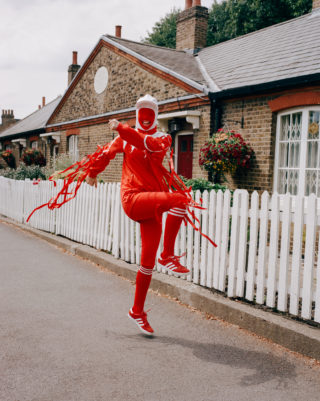
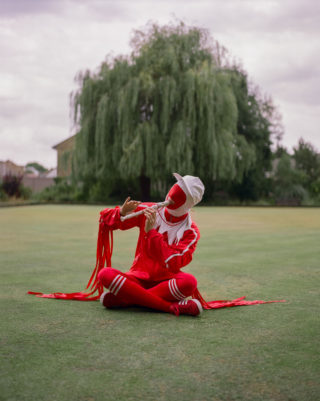
For the first 30 minutes or so after meeting Bernholz, something feels slightly strange, and it’s not until we sit down to talk about ‘Pastoral’ in more detail that I twig what it is: I’m so used to seeing photos of her with a pair of tights over her head that it’s oddly distracting to see her actual features rather than fabric. She’s been playing with her identity and image, obscuring her face through various means, since ‘The Entire City’. That record came on like Karin Dreijer holding a night-time seance with spirits from the netherworld – not just because of its use of spooky synths and supernatural imagery, but because seeing Dreijer performing as Fever Ray was what inspired Bernholz to embrace her own theatrical side.
Finding the guts to make that change was her artistic turning point; the moment she “stopped thinking about what was going to make me feel attractive and cool”, and freed herself from “uncomfortable live situations where I felt not myself, and really boring”. Dressing up was liberating, even if she’s come far enough since that she now describes those initial looks as a “jumble of costumes which never really made a lot of sense”.
What did make sense was her next album, 2014’s ‘Unflesh’, which was both tremendous and terrifying in the way it fused its unsettling sound and visual presentation. She started to manipulate her voice more and more, warping it into something less recognisably human, and the gorgeous gloom of her debut was stripped down into something more nightmarish, thrumming and pulsing and crackling with tension and nervous energy. She sang about illness, miscarriage, feral children. The record started with her emitting a blood-chilling howl to simulate a panic attack, while one of its most striking songs, ‘Anti Body’, detailed a suicide attempt she made in her early teens, and conjured up the dread she felt every time she had to get changed for PE because it meant exposing her prepubescent body to the world’. Later, she realised the costume she’d made, with its blue hoodie and tracksuit trousers, was inspired by that same hated PE kit, and that putting it on made her feel like “a superhero”. “It made me feel really powerful,” she says today. “I wasn’t assuming the role of tortured, scared teenager; I was going into it with a different mindset, with knowledge and revenge. I really want to make that story into a graphic novel, because it’s just calling out for it.”
The initial spark behind the jester costume actually predates ‘Pastoral’. In 2016, she and her musician husband, Jez, worked on an audiovisual project called ‘Kingdom Come For Two Vocalists’ that was commissioned by Future Everything Festival; in addition to the live shows, in which Natalie Sharp (AKA Lone Taxidermist) and Stuart Warwick performed in front of films by Tash Tung and Bernholz’s long-time collaborator Chris Turner, an album of studio recordings was also released. It was based on sci-fi visionary JG Ballard’s 2006 novel, and it seems like you can trace a line between the red-and-white clad jester and the book’s violent hooligans, who wear shirts emblazoned with St George’s crosses while they storm around in an intimidating horde, beating up immigrants. Bernholz says she sees that cross much more often now, especially with the recent World Cup, and it’s hard not to be uneasy about its connotations. “I’m sure it was never intended that way,” she says. “George was Greek.”
Bernholz insists all of her work has been political, and she has a point: themes covered on ‘Unflesh’ included miscarriage and euthanasia. But ‘Pastoral’’s impulse to muddy the quaint myths of the countryside feels especially urgent given the resurgence in an ever-uglier trumpeting of Britain’s treasured national fictions. “I’m not ready to forget this / I’m not ready to accept this,” she half-whispers, half-hisses on ‘Mongrel’, and while she’s adamant that ‘Pastoral’ shouldn’t be taken as her wagging her finger, there’s still an element of fighting back. “It feels impossible to make a difference but, at the same time, you can’t ignore it,” she says. “It’s overwhelming, but we can’t ignore it. Another lyric on that song is ‘I’m too tired to protest this / But I’m worried I’ll regret this.’ So it’s very much about being stuck in that horrible cycle of terrible news after terrible news, and feeling overwhelmed, to the point where you don’t know what you could possibly do – except for protest, but even that’s so exhausting.”
“Watch your back / For they’ll recruit / The quiet ones / At Summer fetes,” she warns on the same song, over a peculiarly queasy melody that sounds like a corrupted ice cream van jingle. It’s an intentionally absurd image, the idea of unsuspecting villagers being radicalised into foam-mouthed English nationalists while taking a break from pinning the tail on the donkey, but it’s not as if there’s a shortage of real-life fanatics to point to. In June, Bernholz says, she came to London to film the video for the album’s lead single, ‘Hobby Horse’ (a perfect relic of the past for the surreal, nightmarish world of ‘Pastoral’, given that it’s a “jaunty prop that’s also really hellish and scary”). On the same day, police clashed with far-right protestors at a violent demonstration on behalf of former English Defence League leader Tommy Robinson. In that sense, both the song’s frenetic, fractured hullabaloo seems eerily prophetic. “My fears are growing / My wounds are showing / My time is up, I want to get the fuck out of here NOW,” pants Bernholz, like she’s being hunted by a pack of wild animals.
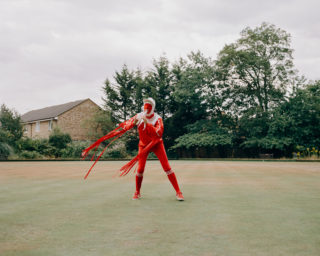
There’s something similarly disquieting about ‘Glory’, on which, underneath shrill, spiralling electronics, you can hear the clashing of metal and marching drums, while Bernholz’s booming vocal channels a zealot trying to stir religious fervour: “Will you become the saint you want to be / Spreading your disease all on one sunny afternoon?” The Crusades have long been fascinations of hers. “Even when I was sort of a pseudo-Christian, when I was a teenager… I loved the whole ritual of it all, and the music and the art. But I remember thinking the Crusades really are a problem, because we can’t just ignore that genocide-plus-rape-and-pillage-in-the-name-of-God thing. When I started learning about that, I fully rejected my Christian upbringing, because it’s pretty obviously full of horror. But I’ve been really interested in that idea of religious fervour and frenzy, of just loving murder underneath it all, done in the name of God.”
I ask if she thinks there’s a link, perhaps, between the way people used those causes as a way to indulge their worst impulses, and violent expressions of toxic masculinity today, especially when it comes to nationalism. “Probably in a very different context,” she says. “We’ve seen it, haven’t we, with these riots – the need to aggressively make a stance or make claims or spread a message. I think there’s this very masculine thing about the Knights, just going off to slay some evil foreigners. The mindset hasn’t really changed. You still get blokes dressed as crusaders going to football games or going on these marches.”
Some of the album’s most memorable characters, though, use poisonous tongues rather than fists; cranky villagers who treat every newcomer with suspicion, and live in permanent fear that their quaint way of life and all they hold dear is under threat. The incredible ‘Better In My Day’ is told from the point of view of a disgruntled cabbie who works himself into a frenzy about how much better everything used to be: “No locked doors! No foreigners! … “Streets were safe back then! Boys were boys! Girls were girls!” His voice gets increasingly tetchy and flustered, and there’s even a sort-of breakdown built around his clucking disapproval: “Tut tut tut tut!” Elsewhere, on ‘Dieu Et Mon Droit’, Bernholz wonders how some people can look at those forced to live on the fringes of society, “kicked into kerbs like empty Coke cans”, and feel only contempt.
That song’s title is taken from the motto on the British passport, even if the words themselves, she points out, are actually French (where those all-important blue passports will be made). “I was thinking about Brexit, and the passports and the hilarity of that,” she says. “But also at the same time, really lamenting a degradation of people’s empathy. I’m talking about a generational divide, and this disappointment in our elders.” Its stark opening image, of people “eating from bins outside supermarkets”, was actually inspired by her time in Brighton, when she’d see young people taking leftover food thrown away by the Co-op near her house. It feels, she thinks, like “we’ve gone back a couple of centuries in that sense.” And yet still, there will always be some people who’ll insist on keeping the scales on their eyes, a “sort of generational clash that you can’t get through”. “God,” she jokes. “I’m saying I’m not finger-wagging, but I really am. Baby-boomers!”
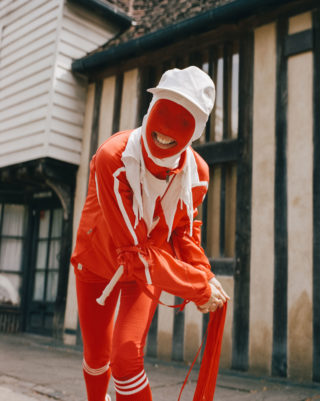
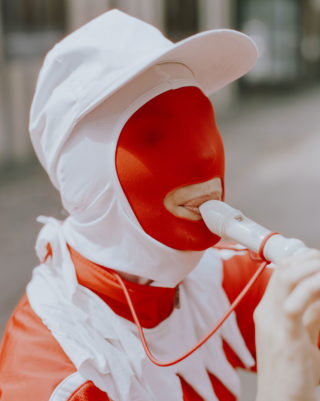
But ‘Pastoral’ never comes across as preachy. It’s too haunting, too discombobulating. It’s also too funny. There’s a reason that the jester is the conduit for all these stories: it’s a figure that suggests mockery and caricature, of taking things to their farcical extremes, of finding laughs in absurd places. “The political stuff is obviously very serious and dark, but it’s also meant to be in the spirit of English humour,” says Bernholz. On ‘Little Lambs’, for example, she’s so irked when some entitled Little Englanders jump the queue ahead of her that her seething becomes comical. “Of all the songs, that’s the most mocking,” she laughs. “Like, ‘Fuck you and your little flags.’ Go ahead, jump in line. I’m carrying a newborn baby, or I’m six months pregnant, but you should sit down on the train first.”
Funnier still, perhaps, is the bathetically titled ‘Jerusalem’, on which a worried citizen rings the police to report a suspicious-looking vehicle, all the while being egged on by Mr Punch (“That’s the way to do it!”). The discordant, nightmarish score and Punch’s rasping cackle make it sound like some dread horror is truly afoot, but the real threat isn’t the abandoned car: it’s that Bernholz has now turned into one of the local curtain-twitchers. The real-life call she made is recreated for the song, and after hanging up, she remembers thinking: “‘I can’t believe I am that person now.’” “Am I becoming this paranoid village spy?” she elaborates. “You know, protecting my little corner of the village, just to make sure that no nasty teenagers do something to us. It was one of those moments where I was like, ‘Shit, I need to check myself, because this is not my concern.’” To voice Punch, the devil-on-her-shoulder coaxing her to the dark side, she learned to use a swazzle, a piece of metal you put inside your pharynx. “There’s a lot of spit,” she confirms. “Disgusting.”
You wonder what her fellow villagers would make of ‘Pastoral’, but she tries to keep her identities separate, and anonymity is one of the benefits of her elaborate costumes. “I like the idea that people can see me, even at gigs, and not really know if it’s a very spritely bloke or a 36-year-old woman,” she says. Skipping out after shows and being able to blend in with an unsuspecting crowd is one of her favourite things. “I’m a bit disappointed when people do recognise me,” she admits. “I always agree to meet if people want to meet me, I’m happy to do that… and I’m grateful and surprised. But I really hate everyone knowing it was me.”
It allows her to be more confrontational onstage than she is in real life, too (it’s usually men, apparently, who seem most scared). She remembers one show in Missouri, America, in a tiny bar, with a young man who seemed like he was drunk or high (as if seeing Gazelle Twin live weren’t already intense enough). “He was making filthy gestures at me, and squaring up to me. He was being a bit of a dick, trying to intimidate me. So I remember just grabbing his hat and wearing it for the rest of the gig, and the rest of the room was with me then, and he just shrank away … I didn’t keep his hat.”
She’s unlikely to face any such opposition with ‘Pastoral’, and even if she’s “bracing myself for people to get irritable” with its more overtly topical bent, she’s not ruffled, either. “I’m prepared for that and don’t mind it at all,” she shrugs. The truth is that these strange, fucked-up times needs strange, fucked-up figures like Gazelle Twin. When people gripe about the lack of political bands, they almost always mean more dreary boys with guitars, when what they really need is more of this: alien shapeshifters with tights pulled over their faces who can fashion something vital and visceral and vibrant from all of the mess. And if you see that red, impish horror prancing towards you, pay heed: it might seem an unlikely prophet, but many a true word is said in jest.